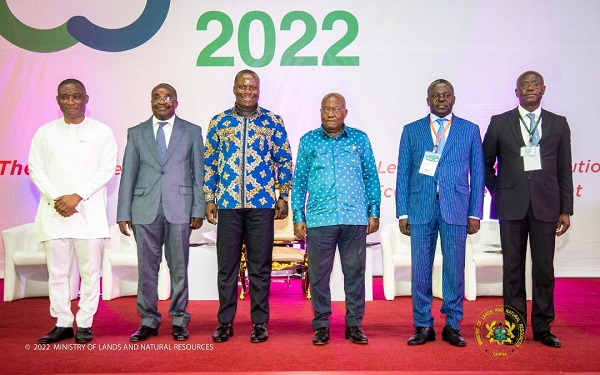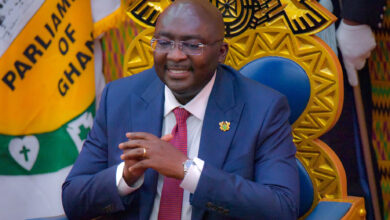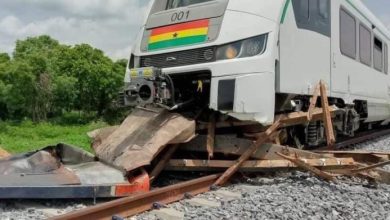Akufo-Addo to land administrators: Expedite action on digitalisation

President Nana Addo Dankwa Akufo-Addo has charged the Ministry of Land and Natural Resources, together with all its stakeholders, to expedite action on the processes expected to lead to the full digitalisation of the Lands Commission to stop the manual administration of lands in the country.
Addressing attendees of the 2022 National Land Conference at the Accra International Conference Centre (AICC), on Wednesday (7 December 2022), on the theme: “Leveraging National Land Policy, Legislation and Institutional Capacity Towards Sustainable Socio-economic Development”, President Akufo-Addo said it is unacceptable for Ghana to continue the processing of lands manually in this age of technology.
“In this age of technology, it is unacceptable that we are still operating in a largely manual environment. We cannot deliver an efficient land administration if documents on land have to be processed manually” President Akufo-Addo said.

“We must therefore expedite action on the digitalization process and ensure that the Commission goes fully digital,” President Akufo-Addo said.
Lands Minister
Minister for Lands and Natural Resources, Samuel Abu Jinapor, in his statement at the opening ceremony, noted that his ministry recognizes the urgent need to ensure that land administration is fully digitalized to make the process efficient and corruption free.
He added that steps had been taken to ensure that all aspects of land administration in the country get digitalized.
“We are working rigorously to ensure the digitisation of the records of the Lands Commission,” Jinapor said.
“This will lead to improved maps and spatial data, digital transformation, systematic recording, verification and creation of national cadastral and implementation of national spatial data infrastructure,” the Lands Minister said.

Conference objectives
The objectives of the Conference are first; to provide a multistakeholder platform for policy dialogue on land issues and challenges and propose recommendations to government for addressing them.
Second, to provide opportunity for discussion and adoption of innovative approaches and enabling technologies for improving land governance and land administration in the country.
Third, increase public awareness and potential benefits of the Land Act, 2020 (Act 1036) and the Land Use and Spatial Planning Act, 2016 (Act 925).
Lastly, to establish a multi- stakeholder platform to monitor the implementation of the recommendations of the conference and generally promote good land governance and land administration.
The Land Conference
The first national land policy formulation process in Ghana started with the submission of the final report of the Law Reform Commission to the Government in March 1994, leading to the start of work on Proposals for the Reform of Land Law in 1975.

Between 1994 and 1997, the final report was subjected to a series of reviews and wide stakeholder consultations to identify policy options for consideration by the Ministry of Lands and Natural Resources.
A draft policy document was discussed at a National Land Policy Workshop in April 1997. The final draft policy document was presented to Cabinet in December 1997 for consideration and approval.
Final approval by Government was received in January 1999. The final policy document was launched in June 1999 and remains the National Land Policy until now.
Following the launch of the policy, the only national level policy dialogue on land was the National Land Forum held in November 2007.
Since then, there has not been any national platform to discuss the challenges confronting the sector and to mobilize consensus on how to tackle them.
The National Land Policy, 1999 identifies several land administrations challenges, the resolution of which are considered fundamental to realizing an efficient and effective land tenure regime in Ghana.
The challenges include weak land administration and management systems, multiple land sales, compulsory acquisition by government of large tracts of land unutilized and compensation unpaid, land market indiscipline, unauthorized occupation and use of state lands by encroachers, haphazard spatial developments, lack of adequate functional and coordinated geographic information systems and networks, indeterminate boundaries of customary owned lands, lack of modern and up-to-date maps and plans, and use of unapproved development schemes.

Guided by the sector analysis contained in the Land Policy, 1999, successive Governments have sought, through numerous initiatives to improve Ghana’s land administration regime.
The major interventions in land administration have been through the Land Administration Project (LAP) – phases 1 and 2, which sought to lay the foundation and consolidate urban and rural land administration and management systems for efficient and transparent land service delivery.





